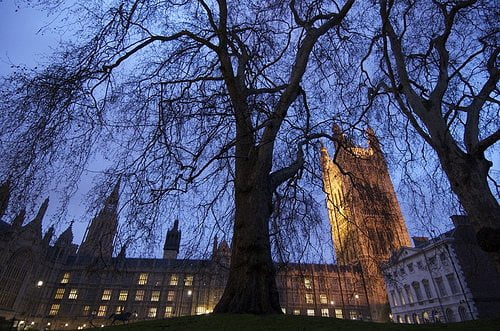

Economy
Autumn statement: the reaction
George Osborne delivered his fourth autumn statement as chancellor of the exchequer on Thursday morning. Here is reaction on a range of issues that the speech covered, including energy, social investment and growth.
This page is being updated as new reaction comes through. Click here to read more from the chancellor.
Simon Howard, chief executive of the UK Sustainable Investment and Finance Association (UKSIF)
“With a sustained economic recovery still far from certain, today’s autumn statement provided George Osborne with a real opportunity to demonstrate that he understands the need for investors to have a clear, consistent and stable policy framework which encourages them to deliver the billions of pounds in infrastructure and energy spending that the UK so badly needs.
“While we welcome both the more environmentally sustainable projects highlighted in the Treasury’s new infrastructure plan and the measures announced today on social investment, recent statements by the prime minister on so-called ‘green levies’ and the lack of anyreal support for the low-carbon economy in the chancellor’s speech today demonstrate a worrying lack of understanding in the Treasury and No 10 of the impact that long-term mega trends like climate change and resource security can have on the UK’s growth and financial stability.
“The resulting political uncertainty will continue to deter investors from providing the capital required to ensure that the UK retains its global position in alternative technologies. It’s a great shame that the chancellor today missed his chance to signal his commitment to developing a coherent policy environment for renewable energy investors.”
Andy Atkins, executive director at Friends of the Earth
“Yet again the long-term health of our economy has been completely undermined by the chancellor’s short-sighted determination to keep the nation hooked on dirty and increasing costly fossil fuels. Handing tax-breaks to climate-wrecking fracking firms simply highlights the fact that George Osborne hasn’t done his homework: they won’t lower bills, MPs say they are unjustified – and they could be illegal.
“The quickest and most cost-effective way to tackle rising energy bills, and end the scandal of thousands of people dying in heat-leaking homes, is to invest in a comprehensive insulation programme. But the government has caved in to big six pressure and given energy efficiency the cold shoulder.
“Building a strong economy and protecting the environment are two sides of the same coin, but yet again the Government has left them both short-changed.”
John Cridland, director-general of the CBI
“We have always advocated the dual approach of tackling the deficit and driving growth – the Office for Budget Responsibility forecasts confirm it is working. Let’s stick with what works. The pressure on the high street has been recognised; the 2% cap on business rates and discount for very small businesses are positive, as is the reoccupation relief.
“Abolishing a jobs tax on employing young people under 21 will make a real difference and help tackle the scourge of youth unemployment. But it was a missed opportunity not to support our hard-pressed energy intensive businesses which are also struggling with rising costs, and the package on housing supply could have been more ambitious.
“As we enter the festive season, positive news on growth is clearly welcome but much remains to be done if the benefits of economic recovery are to reach every home in every corner of the UK.”
Paul Ellis, chief executive of Ecology Building Society
“The chancellor claimed his statement was about the long-term, but I fail to see how any announcement of tax breaks for fracking can be anything but shortsighted. We need to quit our fossil fuel addiction and focus on renewables, not squeezing the last drop of oil out of the ground. And scaling back energy efficiency programmes for lower income households is the ultimate in short-termism: reducing bills now by diluting programmes to save energy in future years.
“It’s right that the government should seek to address the shortage of housing in this country, but again, we need to see energy efficiency as an intrinsic consideration of these developments. Affordable homes aren’t just about the purchase price – they’re about how much it costs to heat and power living in that house. We need to see a longer perspective from the government, rather than a focus on quick wins.”
Richard Hawkes, chief executive of Scope
“It’s great that the chancellor used today’s autumn statement to champion social investment. This sends a very positive signal. More incentives for investment is something we have been working with the government on since Scope became the first traditional charity to list a corporate bond in 2011. We hope the new ‘roadmap’ is the catalyst for a growth in the market.
“Charities can’t just rely on traditional donations. More and more investors are looking for ways to invest their money for a social as well as financial return. We need to bring them together; and we need to encourage more charities and investors to follow suit.
“The Scope Bond offered investors a return of 2% and the opportunity to support our work making this a better place for disabled people. We raised £2m, which we used to fund the opening of new charity shops and acquiring new regular donors, which in turn both provides the income to repay investors and a sustainable income for the work we do supporting families with disabled children. We are constantly looking at new ways to help develop this market.”
Nick Boyle, CEO of Lightsource Renewable Energy
“Our goal is to diversify the electricity market to produce affordable energy for UK consumers. Our hope was that the government would want the same. Sadly today’s statement demonstrates the Treasury remains aligned to the short term interest of big energy companies, rather than thinking long term to drive market competition and lower prices.
“Yes, wholesale solar costs are falling but not enough to justify the strike prices suggested. Solar power is the global energy success story, to show preference for offshore wind is simply counter intuitive. We welcome the growth of all renewables, but the support of one technology should not be to the detriment of others. Ultimately the government has missed an opportunity to act boldly and change the direction of our energy future.”
Paul King, chief executive of the UK Green Building Council
“The chancellor is right to say, ‘Going green doesn’t have to cost the Earth’. If only he practised what he preached. Tax cuts for shale gas are a stark comparison to the butchering of [the Energy Company Obligation (ECO)] we’ve seen this week, a scheme which was helping many households with the cost of living crisis through lower energy bills.
“The emphasis on housing and infrastructure is welcome, but he’s missed an open goal by not recognising the potential for construction to deliver green growth.”
Karen Darby, social entrepreneur and founder of CrowdMission
“There are many amazing social entrepreneurs in Britain, and these tax reliefs will help to mobilise yet more. Social entrepreneurs and their businesses, which give so much back to society, are of growing importance in today’s economic climate. It’s great to see the government start to recognise this. We’re confident that even more socially-responsible businesses will be born as investment demand grows.
“However, incentives are not enough. My business, CrowdMission, was set up to support social entrepreneurs through crowdfunding. Giving incentives for social investment is one thing, but having the means to be able to invest in such businesses is another. We had hoped to see it announced today that crowdfunding investments would eligible to be held in ISAs. This didn’t happen, but hopefully, it won’t be too long until the government recognises the vital role that crowdfunding can play in the recovery of the economy.”
David Nussbaum, chief executive of WWF-UK
“On environmental issues, George Osborne still seems keener to look to the past than to look to the future. Championing the oil and gas sector and handing out tax breaks for fracking jars with the David Cameron’s instance that we’re in a global race to benefit from the green economy.
“The prime minister has just come back from China, where this year already more than half of the new power capacity added to the grid has come from renewable energy. Sadly, he returns to find his own chancellor determined to push Britain back to ever more reliance on fossil fuels.”
Martin Baxter, executive director of policy at the Institute of Environmental Management and Assessment (IEMA)
“The chancellor is committed to securing the economy for the long-term. For the green economy to play a central role, confidence and long term certainty is required. Frequent amends to established green taxes can damage this confidence.
“Long-term certainty is vital for business investment decisions in environmental measures such as energy efficiency and securing business investment. By perpetuating uncertainty with green taxes, the government risks failing to achieve its environmental policy objectives for climate change and any delay will increase the costs of investment to business.
“Green taxes have the potential to drive environment and sustainability right to the heart of business decision making by gaining the attention of the finance director and catalysing improved environmental performance. However, if poorly conceived, they act as a cost on business, undermining competitiveness without achieving their full environmental potential.”
Mark Littlewood, director-general at the Institute of Economic Affairs (IEA)
“The government is basically attempting to freeze both spending and taxation, but this is not sufficient. Government spending as a proportion of national income has not shrunk nearly enough. It’s essential the government reassesses spending levels more radically so they can cut taxes and allow people to keep more of their own hard-earned cash.
“George Osborne’s overall strategy is indeed yielding results, but if deficit reduction is now being shown to work, why not pursue this policy more aggressively? To finally eliminate the budget overspend by 2019 is moving at a snail’s pace. Trimming £3 billion off contingency budgets along with feeble efficiency gains is simply not good enough. He should have taken this opportunity to make much greater reductions in state spending.”
Andrew Croft, CEO of CAN and member of the Social Economy Alliance
“A thriving economy is our main weapon in the fight to improve living standards and conditions for people in Britain. But economic growth does not automatically equal a more prosperous society – smart economic policies that are based on the inextricable relationship between people, communities and the economy are essential.
“We’re calling for support for the advanced solutions emerging from the social economy – social enterprises, cooperatives and other socially-owned businesses are improving social as well as economic conditions, by putting power in the hands of the people.
“Attempts to fix broken markets with outdated economic models will be extremely harmful. We need alternatives that work within markets to shift the very plates they’re built upon, to create economic and social advances that put people and communities first. This is basic stuff – but our leaders are yet to fully grasp and champion the social economy solutions that already exist in the UK.”
Murray Worthy, tax campaigner at War on Want
“Today’s “largest package of measures to tackle tax avoidance”, since the chancellor’s “largest ever package of measures to tackle tax avoidance” announced in the March 2013 budget, is yet more tinkering around the edges of a broken tax system to try and grab headlines.
“These technical tweaks will do almost nothing to stop giant multinationals likes Amazon, Starbucks or Google dodging billions of pounds in tax every year. In fact this government has made it easier for these tax avoiding giants to deprive the government of vital revenue for tackling inequality and funding public services.”
“No one should believe Osborne’s claim that this package of tax avoidance measures will bring in £9 billion in the next five years. Last year he claimed that the government would get £3 billion from UK taxpayers hiding wealth in Switzerland, yet in reality the government is on course to get less than a third of that. Time and again Osborne overestimates the impact of his government’s tax tinkering, this is just another example of his wishful thinking.”
Adam Scorer, director of Consumer Futures
“It’s good that the government is committed to lowering energy bills for homeowners. We particularly support the shift of some programme costs from consumer bills to general taxation.
“However, the bitter truth is that there is no simple, short-term step that will slash the cost of energy. Accountancy changes to how we recover programme costs provide some short term relief but cannot compensate for the lack of a longer term strategy to address the huge cost of wasted energy from people’s homes.
“Cutting back on the Energy Company Obligation (ECO) which directly helps consumers, by £50 per year off bills will help, but will not change the lives of the millions of people suffering fuel poverty. ECO does need to be targeted at households that need it most. But government should seriously consider using some of the billions of pounds that consumers pay in carbon taxes such as the carbon price floor, to fund a truly ambitious and strategic energy efficiency programme that reduces households energy costs, cuts carbon and provides economic growth.
“It would be a shortsighted mistake for the government to cut essential funding for the provision of energy efficiency measures to the nation’s oldest, coldest homes.”
Gillian Guy, chief executive of Citizens Advice
“The upward trend is not filtering down. Optimism in the Houses of Parliament is not being felt in our clients’ homes. Despite the good news on growth, millions are still struggling. Small steps on energy bills and rail fares today will put a bit of extra cash in people’s pockets but the gain will be fleeting.
“Short-term fixes to the cost of living should be met with a large dose of scepticism. We face enormous challenges on youth unemployment, in making the energy market fairer and more transparent and sorting out a woefully inadequate housing stock.
“Encouraging employers to take on young people is good news but with nearly one million under-25s out of work and a pensions time bomb to fund, new schemes must not become a mask for cost-cutting. A £50 cut in energy bills is better than nothing but with price hikes of 37% over the last three years, people will fear further rises will just keep on coming.”
Ben Southwood, head of macro policy at the Adam Smith Institute
“It’s understandable, now that the economy looks finally to be recovering, that the chancellor has moved his focus away from monetary policy, but it’s also worrying.
“Economies can absorb financial crises but they cannot absorb inconsistent monetary policy and massive drops in demand. We need George Osborne to change the Bank of England’s remit, requiring it to stabilise demand according to strict rules. A rule-based monetary policy will stop the economy from overheating into unsustainable booms, and dive-bombing into harsh recessions.”
Clare Francis, editor-in-chief at MoneySuperMarket
“While the chancellor may be in the process of fixing the roof of the economy while the sun shines, the reality is that many UK households are really struggling to find enough buckets to stem the leaks from their own finances. The autumn statement didn’t really go far enough to reassure consumers that things will get better for their own wallets.
“While previously announced changes to personal tax allowances, increases in the state pension and the freeze on fuel duty will be welcome for many, the reality is that bills are continuing to rise. While the reduction in green levies on energy bills seems positive, the reality is that the cost of energy is continuing to rise at a much higher rate, while commuters will still be hit by inflation level increases on the cost of rail fares so can expect more pressure on their outgoings next year.
“Savers will also be disappointed that the pre-statement speculation over changes to ISAs didn’t come to fruition, particularly those who would have appreciated bringing peer-to-peer lending into the tax-free savings wrapper.
“Although George Osborne hasn’t given too much away in the autumn statement, it proves that you cannot wait for external influence to reduce your household bills. Consumers need to take full control themselves and attempt to repair their own roof in a similar way the chancellor is doing with the economy. Making sure you are maximising all of your money by making sure you are on the best deals for your circumstances and ensuring you are not paying over the odds on all of your household finances.”
Donal McCarthy, environmental economist at RSPB
“In celebrating the first green shoots of growth, the chancellor has called for a “responsible recovery”. However, his “long-term” vision seemingly ignores then potential role that the green economy could play in ensuring that the recovery is sustainable and sustained.
“Government departments have faced major cuts over recent years, and that looks set to continue, so we need to start thinking about new and innovative ways that the government might support the protection and enhancement of the natural environment.
“This could start at the local level, with greater support for local nature partnerships, or at the national level in the form of the green investment bank. More broadly, ensuring that the right regulatory frameworks are in place could provide a real boost for the growth of green markets.”
James Smith, manager of the Premier Global Power & Water fund
“Reworking of the Energy Company Obligation (ECO) is a welcome move, relieving some pressure on costs borne by the utility sector. However, given the myriad other pressures on energy costs, customers should not expect a cut in bills anytime soon. They may however increase at a slightly slower rate than they would otherwise have done.
“Hopefully this should herald the start of a more grown up debate around energy prices, the impact of increasing amounts of costly renewable energy replacing cheaper, but dirtier, coal power and the impact of a possible increase in wholesale energy prices over coming years.”
Further reading:
Autumn statement: financial advisers talk social investment tax relief
Autumn statement: sustainable investment industry calls on Osborne to back renewables


 Features9 months ago
Features9 months agoWhat is the Eco-Friendliest Option to Wash Your Dishes?

 Environment12 months ago
Environment12 months agoBuilding a Career in Green Construction: Tips and Insights

 News10 months ago
News10 months ago5 Ways Fleet Maintenance Software Can Help Businesses Be More Eco-Friendly

 Features10 months ago
Features10 months agoAddressing Pressing Ethical Concerns with Crypto Exchanges





























